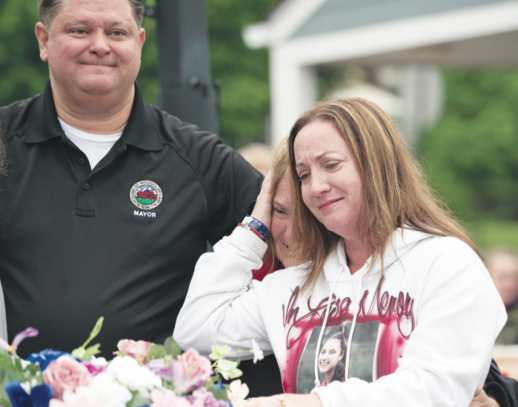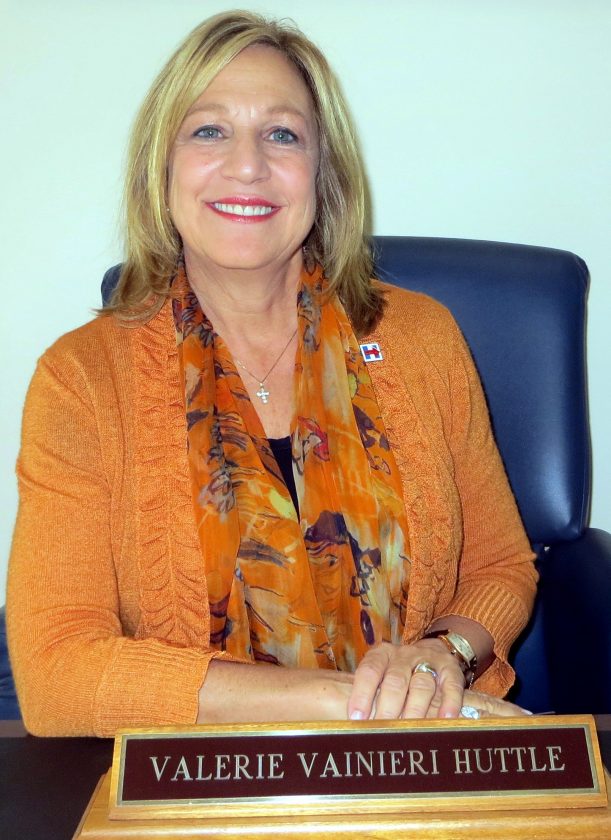
BY JOHN SNYDER
OF PASCACK PRESS
TRENTON—To better equip New Jersey schools to handle active shooter threats and other emergencies, school safety legislation requiring public and elementary schools to install silent panic alarms is now law.
The bill was named for Alyssa Alhadeff, a 14-year old freshman and former Woodcliff Lake resident who was among the 17 people killed in the mass shooting Feb. 14, 2018 at Marjory Stoneman Douglas High School shooting in Parkland, Florida.
Gov. Phil Murphy signed the bill into law Feb. 6, saying in part that the state “will do everything in our power” to prevent tragedies like the one in Parkland.

Meanwhile, Ridgewood High School students are leading a vigil on the one-year anniversary of the massacre, on Thursday, Feb. 14 from 7:30 to 8:30 p.m. at Emmanuel Baptist Church, 14 Hope St., Ridgewood.
The vigil is sponsored by March for Our Lives of Bergen County and Students Demand Action of Bergen County, and co-sponsored by the Community Peace and Justice Forum at Emmanuel and the Social Responsibilities Council, Unitarian Society of Ridgewood.
The law requires the state’s roughly 2,500 public schools install silent alarms that communicate life-threatening or emergency situations to law enforcement.
Bond funds available
The project is estimated to cost $2.5 million to $12.5 million. The bill calls for tapping $500 million in voter-approved bond funding as a source of revenue.
Sponsors suggested the benefits are well worth the expense.
“Our children deserve the chance to learn in peace,” said Ralph R. Caputo (D-Essex), the Assembly sponsor of the bill.
“It has taken six years to get to this day. I thank the leadership of the Assembly and Senate for posting the bill, as well as the governor for creating a pathway for the legislation to become law. Alyssa’s family and community have been steadfast champions of this bill and I commend them for that,” he said.
The new law (formerly bill A-764) requires all public elementary and secondary schools have a panic alarm for use during a security emergency such as a non-fire evacuation, lockdown, or active shooter threat.
When activated, the alarm will remain silent in the building while alerting local law enforcement of the emergency via a signal or message. Schools in municipalities without a local police department would be linked to a location designated by the Superintendent of the New Jersey State Police.

Co-sponsor Valerie Vainieri Huttle (D-Bergen) noted that “In an emergency, every minute counts. It is particularly crucial when children are involved. Too many schools have been targeted and too many innocent people have paid the price. Beefing up school security to better protect our children is a necessity.”
Panic alarms must adhere to nationally recognized industry standards, including the requirements of the National Fire Protection Association and Underwriters Laboratories. Alarms must be installed by a licensed individual in accordance with current law.
School districts will have the option to equip schools with an alternative emergency mechanism capable of performing similar duties as a panic alarm so long as it is approved by the Department of Education.
With recommendations from Murphy, funding for the panic alarms will come from the Secure Our Children’s Future Bond Act, under which funds will be authorized for security improvements to public and vocational schools and community colleges.
A portion of anticipated proceeds of the bonds will be available for the purchase and installation of silent panic alarms.
Additionally, the School Development Authority (SDA) will establish a streamlined program to ensure systems are designed and installed efficiently.
The bill takes effect 10 months after enactment.
Remembering Alyssa
Alyssa, a freshman at Marjory Stoneman Douglas High School, lived in Woodcliff Lake from approximately 2010 to 2014, where she attended Dorchester Elementary School.
Woodcliff Lake’s annual Spring Pear Festival was held last May 12 in Alyssa’s honor. Approximately 1,500 residents and visitors gathered on the Causeway and Woodcliff Avenue to sample food, visit booths, and show support for her family with a ceremony that included a release of 17 doves, one for each of the victims killed.
“The community came out and showed their great support for the Alhadeffs,” said Mayor Carlos Rendo afterward. “We wanted to bring the community together to remember her life and what it represents. She was a student in our school system who played soccer on our fields. Her family and her will always be part of the fabric of our community.”
Rendo, joined by area mayors and Republican Assemblywoman Holly Schepisi, presented Alyssa’s parents, Lori and Ilan, with a key to the borough.
Most of the mayors posed with T-shirts from the Alhadeffs’ foundation, Make Schools Safe [makeourschoolssafe.org].
Lori Alhadeff said at the time that had legislation similar to the then-pending Alyssa’s Law been on the books, the police response to Marjory Stoneman Douglas High School might have been faster.
She added that Make Schools Safe would work to improve school safety nationwide by identifying best practices and implementing these improvements to create model schools.
She said parents need to be personally engaged with school safety and security and pointed out that most schools need security upgrades. She was elected shortly after to the Broward County (Florida) School Board.
